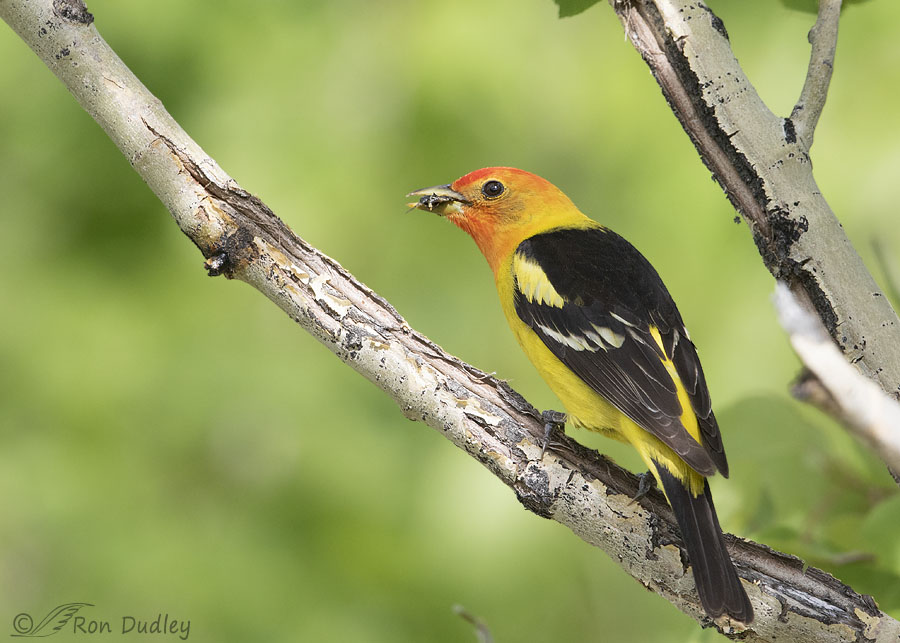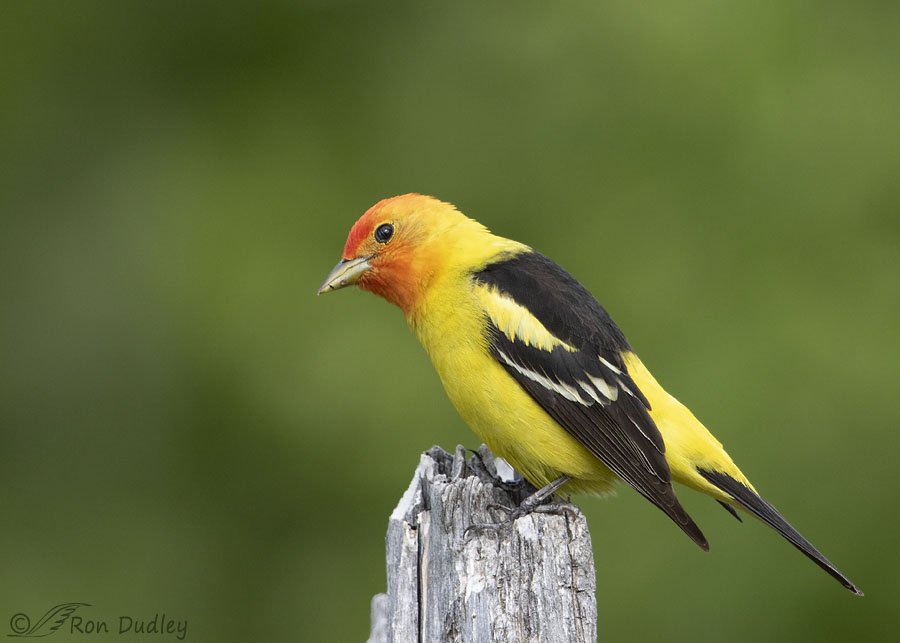More of my favorite bird from my recent camping trip to Montana and Idaho.

1/1000, f/6.3, ISO 800, Canon 7D Mark II, Canon EF 500mm f/4L IS II USM + EF 1.4 III Extender, not baited, set up or called in
The male tanager that hung around my campsite spent much of his time in the aspen trees hawking insects out of the air flycatcher style and he was very good at it. But he also used his elevated perches as lookouts to search for insects on the ground below him and that’s how he spotted and then captured this beetle.
He seemed to spend more time “tenderizing” his food than most birds do and that’s what he’s doing here which explains why the beetle is so mashed up.

1/1600, f/6.3, ISO 500, Canon 7D Mark II, Canon EF 500mm f/4L IS II USM + EF 1.4 III Extender, not baited, set up or called in
Here’s a cleaner shot of him on another of his favorite perches, the dead stump in the open part of the clearing but even here he has bug bits on his bill. I like this side view and his slightly cocked head against the mostly dark spring-green background.
Since I returned home ten days ago this area near the Montana/Idaho border has had pretty severe weather for early summer, including significant amounts of snow. It’s nesting season for tanagers so I hope they’re not already feeding chicks.
Finding enough insects in the snow to keep as many as five hungry chicks satisfied wouldn’t be easy.
Ron


Love the colours! They are a beautiful bird and there seems to be an increase of them this year.
Wow! Late to the party, Ron, but he is such a stunner! Feel free to feature him again and again!
Thanks, Diane. I think he is just about to the end of his blog glory but I may post a photo of the female sometime in the future.
A bit of winged sunrise…beautiful!!!
Thank you, Patty.
Simply gorgeous. Finding itty-bitty insects in the snow would be challenging (as would tenderising their frozen carcasses). I hope they succeeded.
I hope so too. Thanks, EC.
Maybe the weather is why we have more than usual western tanagers still in the valley.
I wouldn’t be surprised.
This guy looks like he needs to pump up on those rhodoxanthins. Maybe he’s mashing up the beetle to extract maximum color.
Lyle, whatever his reason he was doing a good job of it.
Gorgeous shots Ron! Thanks for sharing!
Charlotte
Thanks, Charlotte.
When I had bee hives they would sit on the grapevines and in the trees, contemplating which group of bees they would have for lunch. One after another they would help themselves to the hive dwellers!
I’ll bet you had mixed feelings about that!
Yep, it’s been cold, snow, hail, rain. Beautiful on the Gravelys and other surrounding mountains but as you said, could be tough on the insect eaters. Plenty of red tail nests with chicks and one Bald with chicks close to fledging. The sun is out this am so we are headed out to see if we can see some first flight. Doesn’t seem as though the Ruby will be fishable for weeks due to the heavy snowpack and warming temps. Supposed to be close to 80’s soon which will bring out the insects. Hopefully the Tanangers will make it till then. We saw lots yesterday.
I’m jealous that you’re up there, Frank – especially because you stay for so long. Good luck with the weather, the fish and the birds!
Nice! Gorgeous bird in both settings….. Higher elevations did get snow – we got cold rain and wind…. Fortunately it didn’t freeze here either tho it was pushing the issue. June in MT can be known for lots of rain but it has been a VERY strange year weather wise and it is hard on the critters.
Higher elevations did get snow – we got cold rain and wind…. Fortunately it didn’t freeze here either tho it was pushing the issue. June in MT can be known for lots of rain but it has been a VERY strange year weather wise and it is hard on the critters.
Judy, I haven’t heard if they had any frost damage in Cut Bank so hopefully it didn’t happen.
Beautiful bird and photos Ron and very interesting commentary. Weather has much to do with bird and wildlife survival. Hope you are having a restful weekend.
Thanks, Everett. No, it hasn’t been a restful weekend but I am getting a few things done (with some help).
LOL @ tenderizing! That cracked me up!
Snow in the middle of June? Is that usual for Montana? It seems really late for this Washingtonian girl. I hope ALL the birds are okay!!
Shelley, it isn’t “usual” but it happens fairly often. Ken used to say that he’d seen it snow on the farm every month of the year.
Beautiful! Weather has been a tough break for many around the country.
Do you know whether they will nest again if the weather causes their nest/young to fail?
Dick, there are recorded instances of them re-nesting after loss of their nest/brood but I don’t know how often it occurs in that situation.